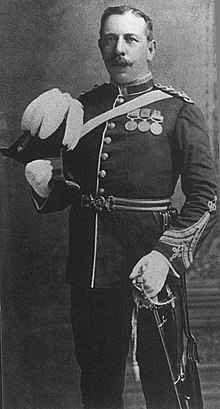Frank Bourne
This article has multiple issues. Please help improve it or discuss these issues on the talk page. (Learn how and when to remove these messages)
|
Frank Bourne | |
|---|---|
 Photograph of Frank Bourne taken c.1905 | |
| Born | 27 April 1854 Balcombe, England |
| Died | 8 May 1945 (aged 91) Beckenham, London, England |
| Buried | |
| Allegiance | |
| Service | |
| Years of service | 1872 - 1907, 1914 - 1918 |
| Rank | Lieutenant Colonel |
| Unit | 24th Regiment of Foot |
| Battles / wars | Anglo-Zulu War World War I |
| Awards | Officer of the Order of the British Empire Distinguished Conduct Medal |

Lieutenant-Colonel Frank Edward Bourne OBE DCM (April 1854 – 8 May 1945) was a decorated British soldier who participated in the defence of Rorke's Drift during the 1879 Anglo-Zulu War. He was the last known survivor of the battle.
Early life
Born in Balcombe, Sussex, England in 1854, Bourne enlisted in the Army at Reigate on 18 December 1872, aged 18 years 8 months. Four years later he had been promoted to Colour Sergeant becoming the youngest NCO of this rank in the entire British Army. This earned him the nickname 'The Kid'.
Rorke's Drift
On 22 and 23 January 1879, Bourne was part of the garrison at Rorke's Drift, Natal, South Africa, which held off a Zulu army. Bourne, who was now an NCO in B Company, 2nd Battalion, 24th (2nd Warwickshire) Regiment of Foot, helped organise the defence at the mission station and field hospital. Throughout the day and night of the battle, the Zulus made repeated attacks against the barricades, but the outnumbered defenders held out until relief arrived.
For his bravery, Bourne received the Distinguished Conduct Medal (DCM) for "outstanding coolness and courage" during the battle, with a £10 annuity. The DCM, until 1993, was the second highest military decoration (after the Victoria Cross) awarded to other ranks of the British Army. He was offered a commission, but "being an eighth son, and the family exchequer ... empty", he declined it.
Later career
After Rorke's Drift, Frank Bourne served in British India and Burma, being promoted to Quartermaster-Sergeant in 1884.[1] He was commissioned in 1890. In 1893 he was appointed Adjutant of the School of Musketry at Hythe, Kent, retiring from the Army in 1907. During the Great War, he rejoined and served as Adjutant of the School of Musketry in Dublin. At the end of the war, he was given the honorary rank of Lieutenant Colonel and appointed OBE.
Bourne lived in retirement at 16 King's Hall Road, Beckenham, Kent. He was the last surviving defender from Rorke's Drift, dying on VE Day (8 May 1945), at the age of 91. Bourne was buried in Beckenham Crematorium and Cemetery.
Film portrayal
In the 1964 film Zulu, Bourne was played by Nigel Green. Green was considerably older (about 40 years old) and taller than Bourne, who was 24 and 5' 6" (1.68 m) at the time of the battle.
Notes
External links
- www.rorkesdriftvc.com, (2459 B Co. 24th. Regiment) (biography, photos, memorial details)
- Transcript of radio interview with Colour Sergeant Bourne recorded in 1936
- Rorke's Drift Details at www.victoriacross.co.uk listing of medal recipients, casualties
- Use dmy dates from May 2013
- 1854 births
- 1945 deaths
- Recipients of the Distinguished Conduct Medal
- Officers of the Order of the British Empire
- South Wales Borderers soldiers
- South Wales Borderers officers
- People from Mid Sussex (district)
- British Army personnel of the Anglo-Zulu War
- British Army personnel of World War I
